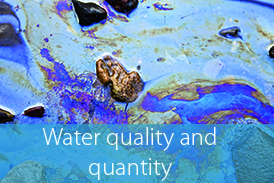Water quantity and quality

The OECD recommends that governments - national and local - encourage the joint management of water quantity and quality. Water quantity and quality can mutually reinforce or affect one another. For instance, wastewater collection, treatment and reuse, is a good illustration of how water quantity and quality management cohere. OECD’s work on water quantity focuses on water allocation regimes, water use efficiency (and the role of economic policy instruments). Work on water quality focuses on diffuse pollution and contaminants of emerging concern (such as pharmaceutical residues and microplastics in freshwater).
POLICIES TO COST-EFFECTIVELY MANAGE CONTAMINANTS OF emerging concern in freshwater
Pharmaceuticals are essential for human and animal health but they are increasingly recognised as a contaminant to environmental and human health when their residues enter freshwater systems: psychiatric drugs alter fish behaviour; endocrine disrupting pharmaceuticals cause reproduction toxicity in fish and increased risk of breast or prostate cancer in humans; and the overuse of antibiotics is linked to antimicrobial resistance – a global health crisis. The situation is set to worsen with growing use of pharmaceuticals projected with economic growth, ageing populations, advances in healthcare, and increased livestock and fish production. The OECD report Pharmaceutical Residues in Freshwater: Hazards and Policy Responses helps to close the science-policy loop. It provides policy guidance to cost-effectively reduce human and veterinary pharmaceuticals in freshwater, and their associated risks to human and environmental health.
The report was informed by the OECD Workshop on Managing Contaminants of Emerging Concern in Surface Waters, 5 February 2018, Paris. The workshop was dedicated to bringing together stakeholders from various government departments (environment, health, chemicals), water and wastewater utilities, pharmaceutical industry, NGOs, IGOs and academia to discuss common issues and how to address them. The Summary Record, speaker presentations, agenda and list of participants are available on the workshop webpage.
ALLOCATING WATER WHERE IT CREATES MORE VALUE
In that context, the ability to allocate water where it creates most value is a condition for sustainable growth, social equity and environmental performance. The OECD has reviewed prevailing water allocation regimes in a range of countries and has derived policy messages on the design of water allocation regime and the transition towards effective ones. Recent work provides policy guidance on how the design of allocation regimes can be tailored to adjust for the distinctive characteristics of groundwater resources.
Reports
- Groundwater Allocation: Managing Growing Pressures on Quantity and Quality
- Water Resources Allocation: Sharing Risks and Opportunities and Policy Highlights
Green Talks LIVE recording
Tackling the diffuse water pollution challenge
OECD countries have struggled to adequately address diffuse water pollution. It is much easier to regulate point source industrial and municipal polluters than engage with a large number of farmers and other land-users where variable factors like climate, soil and politics come into play. But, as the report points out, the cumulative effects of diffuse water pollution can be devastating for human well-being and ecosystem health. Ultimately, they can undermine sustainable economic growth. The report also presents a risk-based policy framework to tackle this challenge. Innovative policy responses need to be replicated, adapted and scaled-up if they are to have an effect.
Report
Green Talks LIVE recording
MANAGING FLOODS AND DROUGHTS IN AGRICULTURE
More work is ongoing on the management of floods and droughts and agriculture.
- Find out more on OECD work on agriculture and water
- See also relevant sections of the OECD Council Recommendation on Water
Related Documents

